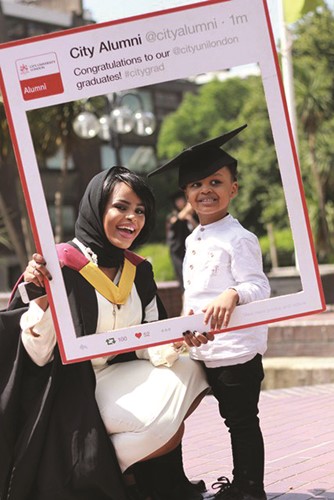
A SCHOLAR AND A STAKEHOLDER
Based in the heart of London, City University is a bastion of academic excellence and inclusion. Now, the university is harnessing this to turn its scholars into stakeholders. Amy Sandys reports
Challenge: The UK’s higher education sector is precarious. Barely a week goes by without a university being subject to scrutiny on fees, expenses or future expectations. For communicators, this makes the already fraught task of recruiting and retaining legions of loyal students who will remain integrated in the university community as alumni and advocates ever more precarious. And for City University, a central London institution known for its vocational qualifications and industry involvement, the best time to solidify its reputation among potential students and outgoing students is twice a year during the university’s graduation ceremony periods.
Arguably the pinnacle of a student’s academic endeavours, marketing materials and external campaigns promoting the ceremony are supplemented through a digital strategy focusing on what it means to be a City student in a city defined by its diversity and tolerance. “Universities do have good stories to tell and graduation is one of the opportunities for us to do that,” says Ryan Taylor, head of digital communications at City University. “Graduation is the culmination of someone’s endeavour which is quite intense and academically challenging – so the actual graduation ceremony encapsulates all those different areas and the stories around these individuals.” Ensuring the university celebrates the students and recognises their contribution to its communty, while communicating its higher education offering as wide as possible, drives City’s digital communications.
Strategy: “Graduation is the perfect opportunity to start telling the story of the people who have been in that ceremony and who are now out in the world,” says Taylor. “But engaging people into being part of the university community is really what drives our strategy.” Despite the team’s focus on graduation, then, for Taylor going beyond the pomp of the Barbican ceremony, is core in turning City students into stakeholders. Crucially, and perhaps unlike other universities, City’s digital team focus not just on the stories of students, but on the stories of the familial networks which usually offer unwavering support during a student’s three, four or more years in London. Then, feelings of pride and celebration throughout the day can be harnessed into shareable content across the university’s channels. “On the day there’s the ceremony with the robes and the gowns and the hats, but beneath that we find there’s lots of really individual stories,” says Taylor. “Particularly around social media, it’s given us an opportunity to talk about real people. And it’s not just the students – there’s a whole realm of people who helped contribute to that success.”
For Taylor and the communications team, working alongside the marketing and alumni teams over the course of the graduation period means high participation in social media platforms such as Facebook, Instagram and Snapchat. Not only can the students actively contribute to the university’s social media feeds – often faraway, relatives can participate too. What is particularly striking, says Taylor, is the students’ ability to post self-crafted content on the wider university community pages, particularly on Instagram, which invites participation both through image creation and live video. Using the #CityGrad hashtag, “A lot of the content is people creating posts themselves with celebration and the pride,” says Taylor. This pride extends further than the ceremony, however.
City University graduates often pursue vocational courses, particularly in careers such as nursing and midwifery – many graduates are above the average 18-21 cohort age. “These are occupations where graduates are really making a difference to society,” says Taylor. “And often they include people who have started studying later in life so there’s a whole story about why they got into nursing in the first place.” For the communications team, tapping into the stories behind career choice provides a colourful tapestry of content, and shows how a connection to City can have a societal impact. “Strengthening the connection when graduates are at their happiest has a key role to play in later recruitment and attainment campaigns led by City to attract new students,” says Taylor. “On a wider basis there’s this global network of other people at City, who you can tap into for career advice. There’s opportunity for current alumni to be mentors for current students and there’s opportunity for alumni to find mentors or themselves and their career.” Students cease to become just customers; drafted into a welcoming alumni community characterised by togetherness, City can help them on the way to a secure future.
Results: Future success in the university’s digital communications relies on the continued ability to innovate. As the world of social media evolves, higher education institutions need to ensure their stakeholder relations reflect digital trends and continue identifying the platforms where audience engagement is highest.
Yet, the higher education environment is not only challenging, but competitive. The university must continually be one step ahead if it is to develop successful recruitment and stakeholder campaigns that cut through the noise made by competing institutions. “People are always being bombarded with communications, so we always look at how we can make content that’s useful,” says Taylor. “People need advice about how to get to university as well as being told the benefits, so we need content that is relevant and useful and timely.”
While mobile-first, image-led sites such as Instagram and Snapchat might engage a younger, current student audience and their families, it is vital that school pupils or older candidates researching the university as a potential future choice can connect – digitally and emotionally – with City University’s graduating cohorts. “Video content is important, however most traffic to the website is still on desktop,” says Taylor. “In times where higher education is going through some challenges around perception, the digital storytelling is something good – it says where City is going, and about where the university positions itself.”





